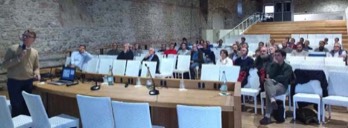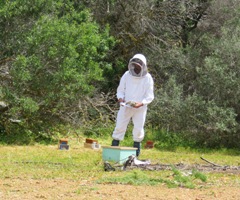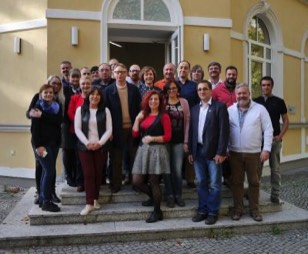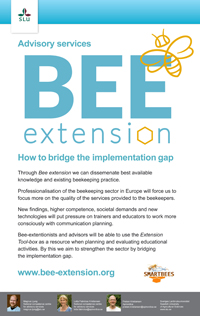SmartBees Newsletter 6, October 2018
SMARTBEES will finish by the end of this month and we take the last opportunity to inform our interested reader on the progress of our work, the highlights of the past months and provide an outlook on the future beyond the end of SMARTBEEES
Regional workshops
SMARTBEES arranged 6 regional workshops from late May through October 2018 to disseminate important results from SMARTBEES to stakeholders:
- Copenhagen, Denmark, May 26th
- Athens, Greece, June 9th
- York, UK, September 25th
- Lazise, Italy, October 6th
- Bucharest, Rumania, October 13th
- Görlitz, Germany, October 20th

IHBBN – a new organization for honeybee improvement and conservation

The new organization was named “International Honey Bee Breeding Network” abbreviated IHBBN.
The aim of the organization is to aid to the genetic improvement of local honey bee stocks and the conservation of the different subspecies of the honey bee within their native range.
This shall be done, among other things, by
- coordinating honey bee breeding and conservation activities;
- collaborating with local networks;
- facilitating the trust and interaction among the breeders;
- improving the genetics in terms of Varroa resistance and other desirable traits;
- assisting in administrative issues.

After agreeing on the statutes the participants elected a management board with 6 members:
- Cecilia Costa (Italy): President
- Dylan Elen (Belgium & UK): Secretary
- Maja Drazic (Croatia): Treasurer
- Raffaele Dall’Olio (Italy): management board member
- Egoitz Galarza (Spain): management board member
- Bjørn Dahle (Norway): management board member
Picture: Participants at the meeting arranged in Hohen Neuendorf to establish IHBBN
Bee-extension – an extension tool-box on the web
Bee-keeping goals focus on biological, technical or economic challenges, but solutions often lies with people. Extensionists and advisors recognise the central role people play in all efforts to implement sustainable bee-keeping practices. Strategies to develop bee-keeping in Europe must therefore include issues related to communication, learning and behavioural change. In the Smartbees project this has been done in an integrated way; through training and dissemination activities, but also by a specific work package aiming to develop a web-based resource for communicators and advisors within the bee-keeping sector. The new homepage was launched at the EURBEE-conference in Ghent in September this year; http://www.bee-extension.org

bee-extension.org will be administrated by the National Competence Centre for Advisory Services at the Swedish University of Agricultural Sciences. They have been responsible for WP5 within Smartbees, including surveying bee-keepers across Europe, analysing existing knowledge and innovation systems within the bee-keeping in a sample of European countries, as well as identifying bottle-necks and challenges for educational service providers today. These aspects together creates the fundament for the new web-based resource.
On Bee-extension you will find guidelines, helpdesk, and best practices, but also possibilities to deepen your knowledge on extension through more in-depth texts. The models presented are adapted to the specific challenges within bee-keeping, with a large number of bee-keepers not used to pay for advisory services, and building their competence development on informal learning among peers. The aim is to tap into existing pre-conditions, while at the same time adding insights from extension theory and advisory services from other sectors in agriculture.
Lack of effective communicative skills and strategies might become a threshold for not only a sustainable and increased production from honey bees, but also society’s ability to strengthen and develop new ecosystem services based on pollinators. This part of the Smartbees-project aims to make such thresholds as low as possible.
Magnus Ljung, WP5-leader
PhD and Principal Extension Officer
National Competence Centre for Advisory Services, SLU Sweden
Bee-Extension.org
SMARTBEES - beyond the project
SMARTBEES ended its 4 year project period October 31st. We are grateful to all stakeholders that contributed to the project in various ways: answering our questionnaire, providing samples, breeding queens, testing the performance of the queens and coordinating the breeding activities.
Although the project has come to an end, the SMARTBEES team will continue the work to finalize scientific- and popular publications in the months to come.
Although the project has come to an end, the SMARTBEES team will continue the work to finalize scientific- and popular publications in the months to come.
Impressum / Legal note

